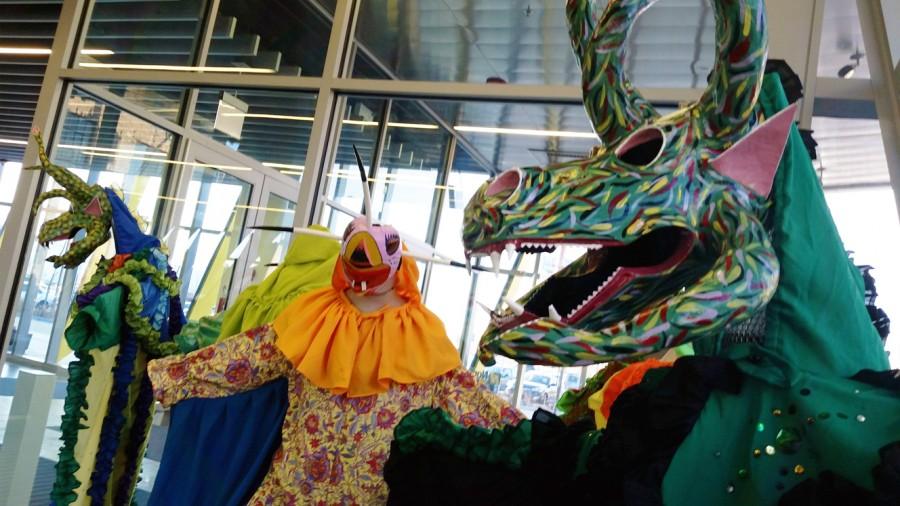Carnavales De Puerto Rico
Arts & Life
Colorful Vejigante masks and costumes.
Seven masks, four drums and three guitars can all individually lead to a good time. Together, they formed a dynamic and vigorous festival about Puerto Rican carnavales on Thursday evening, April 2, 2015 at NEIU’s El Centro campus. The festival was a celebration held to honor Puerto Rican arts and heritage. The Puerto Rican Arts Alliance (PRAA) wanted to bring attention to Puerto Rican culture, specifically music and art, and to inform individuals in the community of their workshops they provide for youth. The night closed with a special performance by band Buya, an Afro-Puerto Rican drumming group.
PRAA was founded in 1998 and has held music programs for 15 years. They offer mask making workshops for children and create Vejigante masks of Puerto Rico used in Puerto Rican carnivals. Several masks and outfits were displayed Thursday evening for the celebration; one of the artists displayed was Kenneth Melendez from Ponce, Puerto Rico, who taught at the workshops as a visiting artist.
In addition to the mask making workshops, they also offer cuatro (a traditional instrument of Puerto Rico), guitar and violin lessons by a string ensemble. The lessons, for children ages 8-17, are free.
Maria Luna-Duarte, the interim director of El Centro and a representative of PRAA who introduced the events and their significance, gave brief speeches. “It is wonderful that we can feature original handmade masks and costumes from the three largest carnavales on the island. It is very important to bring a piece of our wonderful Latin American culture, in this instance of the Puerto Rican culture, to Northeastern Illinois University, El Centro,” said Luna-Duarte.
Art was displayed from El Carnaval de Máscaras de Hatillo, Las Fiestas de Santiago Apóstol de Loíza and El Carnaval de Ponce. Displays included photographic exhibits and small narrations about the mix of African and Spanish culture found in Puerto Rico.
Carlos Hernandez, founder and executive director of PRAA, also spoke briefly about his organization and its new partnership with NEIU. “We feel it’s a neighborhood university that really wants to connect with the children, the residents of the community in its area,” said Hernandez.
This was the first event of its kind ever held at NEIU’s El Centro location. “This exhibition, called Carnavales de Puerto Rico, is one of many other activities that we will be doing with Northeastern Illinois University, I’m proud to announce,” said Hernandez when referring to the future relations PRAA will have with NEIU.
Janet Morales, who is Puerto Rican, will be a new student at NEIU this coming August. She expressed her excitement for the workshops because of her children, of whom she said were not too familiar with their roots. Her son seemed very interested in the Vejigante masks and even brought a creation of his own that evening.
Victoria Salas, an NEIU student, also joined the festivities. She said she thought the festival would be a good function to attend for one of the required off-campus events. Salas was particularly enthusiastic to hear that the children would be receiving free workshop classes. “It’s awesome,” Salas said. “To get young kids interested in music or something that’s going to be productive for them versus, them just sitting at home playing videogames or kids that are out on the streets.”
When the band Buya began to play later that evening, the crowd flocked around them in anticipation, some ready to dance to the beating of the drums. The first woman to let the music carry her away engaged the drummers and matched their tempo as she danced the folkdance of the bomba. One of the main singers, Lauren Brooks, called out to the audience and encouraged them to join in. “Don’t be shy, come up and dance,” she said.
They described each other as “family” and emphasized how dedicated to their music they are. Band member Angel Fuentez has been playing bomba music since he was 16 years old — he’s now 35. Smith felt that the music they play is important because, “the band does an excellent job to connect the Diaspora of African and Puerto Rican heritage.”
Your donation will support the student journalists of Northeastern Illinois University's The Independent, either in writers' payment, additional supplies and other items of note. Your contribution will allow us to purchase additional equipment for writers/photographers/illustrators and cover our annual website hosting costs.
Laura Rojas




